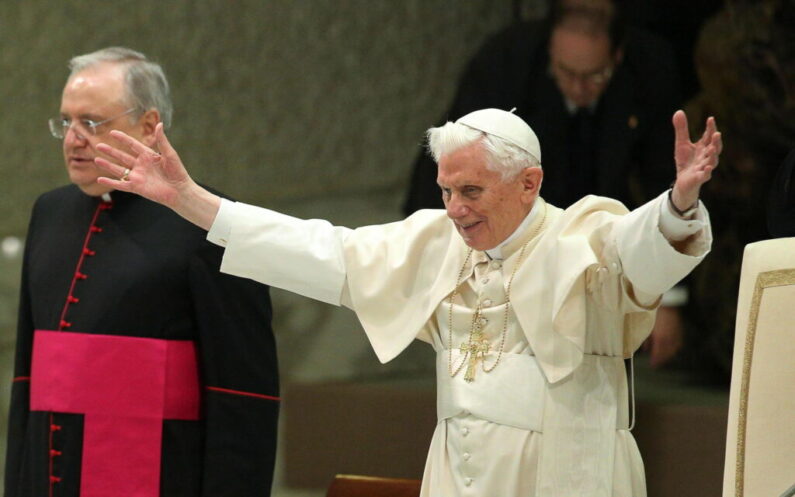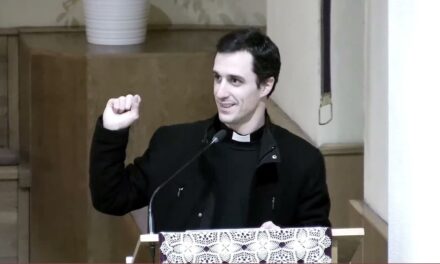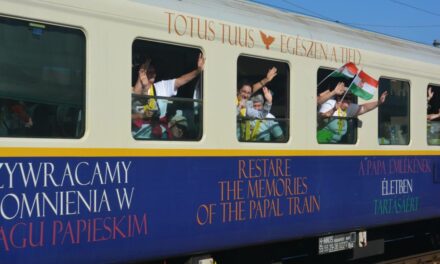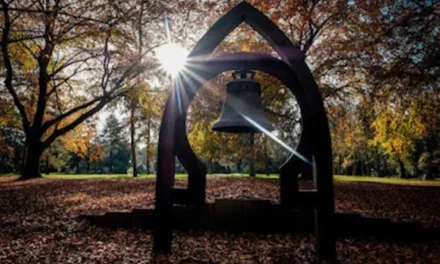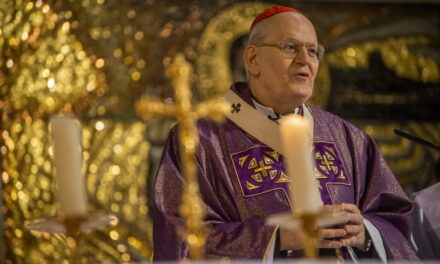It is God's special grace that he reached the XVI. The news of the death of Pope Emeritus Benedict (1927 – 2022) broke on the morning of December 31, 2022, shortly after his death at 9:34.
Before the funeral scheduled for Thursday ahead of us, I am writing these lines as my repeated and extended tribute as a Reformed priest and denominational researcher, since even during Benedict's papacy, I continuously studied the career and encyclicals of a unique theologian who could only be compared to the Swiss Reformed Károly Barth in the 20th century. Similarly, some of his apostolic writings and teachings.
What was the greatest surprise and joy that XVI. Pope Benedict wrote his three volumes about the Lord Jesus with an extraordinary note-taking device. He quoted the best Protestant biblical scholars with scholarly impartiality. In my accommodation here in Rome, I cannot turn the pages of the three volumes, as they are on my bookshelf in Budaörs, but I am surely not wrong if, based on my own statistics, I note here that he cites Protestant theologians dozens of times.
Not with a controversial, debating or even controversial argument, but with an intention to support his own sentences. I thought this was a great thing from the leading theologian of the Congregation for the Doctrine of the Faith. This can only be done by a deeply humble believer who lives every moment of his life coram Deo, before the presence of God, and who knows:
It lives from God's surpluses, ontological pluses, from the grace that ennobles the created cosmos after the disobedience of the first man with the redemptive work of Jesus, and ennobles it back to the Creator Father.
Sola gratia - by grace alone. Today, here in Rome and at home in Budaörs, as a Reformed theologian, I thank XVI. To Benedict, and to the Holy Trinity, who gifted him with this, to an eternal God.
There can be no doubt for anyone that Cardinal Joseph Ratzinger and Karol Woytila II had their assigned place in God's space-time coordinate system. to Pope John Paul. They had a common place next to each other and for the world church and even for world history. Woytila's amazing energy and determination as a church governor to overcome godless atheism and church-destroying, church-persecuting Bolshevism met in the decree of the exceptional gratia Dei, the divine sovereignty governing history.
In a healthy way, in a way that shapes each other into world energy. The Polish Pope felt and knew who he could and should rely on. II. Already at the beginning of his papacy, John Paul wrote to Archbishop Ratzinger:
"I absolutely need you."
This is how it happened that on November 25, 1981, the Polish Pope appointed Cardinal Ratzinger as prefect and head of the Magisterium, the "brain trust" of the Roman Catholic Church. With a staff of forty people, he began his energetic, conservative, value-preserving spiritual and doctrinal work in the Vatican. All that can be mentioned here is that II. The Polish heart of János Pál and Cardinal Ratzinger's extremely well-educated, analytical genius for theological and political nuances and nuances, and their mutually reinforcing interactions, were also shown in the fact that the prefect became the "motor of ecumenism" in the Vatican in order to represent the papal aspirations. The Joint Declaration on the Doctrine of Rectification, signed with the Protestant churches in 1999, became a permanent document of this.
Many things followed.
Events and decisions that can be evaluated positively and negatively. Condemnation of liberation theology, suspension of reform theologian Hans Küng. What can now be recorded as an undoubted merit due to its historical effectiveness and permanence is this: the eternal alliance of the German Cardinal Ratzinger with the Polish Pope, countersigned not by signature, but by spiritual cohesion and togetherness, the special Polish-German alliance conceived in grace, even healing it influenced that the III. Following the Empire's brutal attack on Poland, decades later this cruelty was present in their relationship as a real motive for atoning and healing sacrifice.
THE HOOFED POPE WHO WALKED AMONG SECRETS
He returned home at the age of 95. Retired Pope Benedict died on Saturday at 9:34 a.m. in the Mater Ecclesiae monastery in the Vatican. He will be buried on January 5, 2023, the day before Christmas in the Orthodox world. The choice of date is certainly not accidental. The humility and meekness that XVI. The personality of Pope Benedict also radiated towards other denominations. Her almost girlish voice and the soft intonation of her speech were the God-attunedness of a person who is constantly looking inward and upward. With Pianissimo in front of the secrets. Prayer and inner contemplation permeated his words, gestures, and restrained smile. You could feel it: you walk among the wonderful secrets of the revelation and in the world of holiness every moment. Wherever you are allowed to move with your shoes off and the spirit of "Where I am, Lord, your servant hears". There are those who feel the subtle resonance of the teacher and the academic, the highly educated scientist in this personality-pianissimo. Perhaps his love of music and the fact that he himself was happy to sit at the piano to "communicate" with Beethoven and Mozart and others in the language of sheet music helped him to have this spiritual character.
The learned theologian who spoke six languages, wrote and thought in four languages deserves respect.
He was and remained a dogmatist as pope, but in the fuller sense of the word, who always sought the living source, the living Lord, behind the dogmas. The Whistleblower. He included Him in the tenets and taught Him. He himself waited for His teaching and invited the children of the church to accept it. He led his church in following the Risen Lord by the thought-giving and stimulating Spirit.
EVANGELICAL RADICALISM - THE UNIVERSITY OF THE CHRISTIAN MAN - JEWISH RECOGNITION
XVI. Benedek's evangelical radicalism, i.e. his "desire for depth and heavenly heights" seeking evangelical connections behind everything and in everything, made him capable of exceptional theological achievements. In many of his books, especially "Salt of the Earth" published in 1996 and "Jesus of Nazareth" published in 2011, his spirituality is characterized by a biblicalness, thoroughness, contemplative style, and choice of language that evoke Protestant theologians. He proved the true universality of the gospel, catholicity, not in the ecclesiastical and dogmatic sense, but in the biblical sense. His theological openness is shown by the fact that he repeatedly quoted the Protestant Joachim Jeremias, who unfolded the parables of Jesus, the Orthodox Paul Evdokimov, who wrote the theology of beauty, or the Lutheran theologian of hope, Jürgen Moltmann, and the Old Testament researcher and scholarly editor of the Biblia Hebraica in Stuttgart, Karl Elliger.
He lived, wrote, thought and created in such spiritual heights and biblical dimensions, which are truly characterized by the true, Christ-like universality. In the book of Jesus, he justified it with biblical and theological arguments: the thesis and historical accusation that the Jewish people can be held responsible for the crucifixion and murder of Jesus cannot be based on the Scriptures. Chief Rabbi David Rosen, head of the American Jewish Committee, expressed this view based on this vision and the head of the church's statement:
"It is quite obvious that Benedict is a true friend of the Jews".
THE POPE OF APOLOGIES, SELF-REVISION - WITH MOZART IN HEAVENLY HARMONY AND PRAYER
XVI. It follows from Benedek's humility and from the daily practice of his biblical self-examination that he asked for forgiveness several times. So, for example, from the Muslims for the ambiguous part of his speech in Regensburg on September 12, 2006, in which he quoted a Byzantine emperor and said that Muhammad only brought evil and inhuman things to the world. He apologized on behalf of others on 19 July 2008 in Australia to those who were sexually abused by Roman Catholic priests as children. On June 11, 2010, at the Vatican Mass, he apologized to those who were victims of abuse in the Catholic Church. His encyclicals present us with the Pope who, living in today's world, seeks and formulates evangelical guidance, advice, sometimes criticism, but always placing the most critical questions in a Christian moral context. So, for example, the trends of the financial world order or the serious issues of the global crisis.
His high theological intellect and creative power accompanied him even in the divine silence of his retreat. Here he expressed his thoughts further, in pianissimo coram Dei. In absolute silence before God. And accompanied by piano playing. In this, he resembled the Reformed theologian with the greatest oeuvre after Calvin, Károly Barth, who was still listening to Mozart on the day of his death. This is what he testified: when the angels sing the praises of God, they play Bach, when they are among themselves, they play Mozart for their own pleasure. Now both of them are singing thanks to the King and Lord of the Universe with their heavenly arms. XVI. And the earthly program of Pope Benedict speaks to all Christians as a legacy that survives him:
"In futuro vita orationi dedicata Sanctae Ecclesiae Dei toto ex corde servire velim./In the future I wish to serve the holy Church of God with all my heart with my life dedicated to prayer".
Now from color to color.
May his work on earth be a blessing, ad maiorem gloriam Dei - for the greater glory of God.
Dr. Lajos Békefy
Featured image: XVI. Pope Benedict greets the faithful at the Vatican's St. Peter's Basilica VI. He held his weekly general audience in Pál's hall on January 2, 2013. (MTI/EPA/Alessandro Di Meo)

